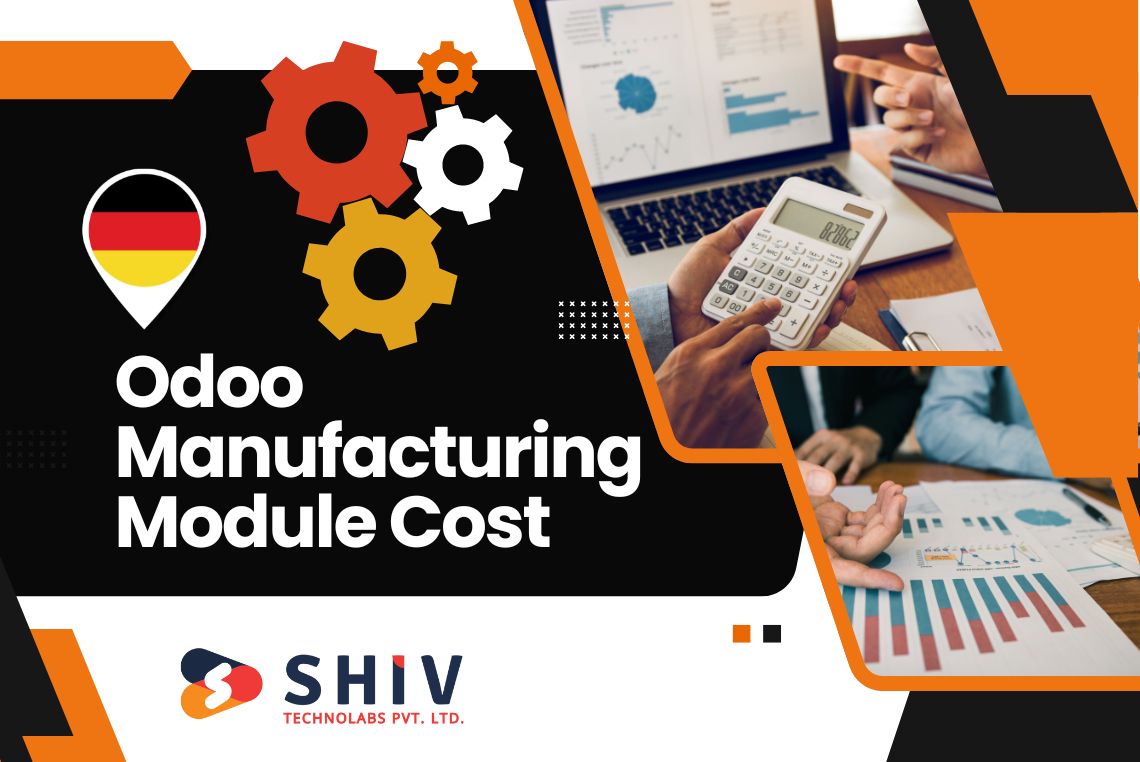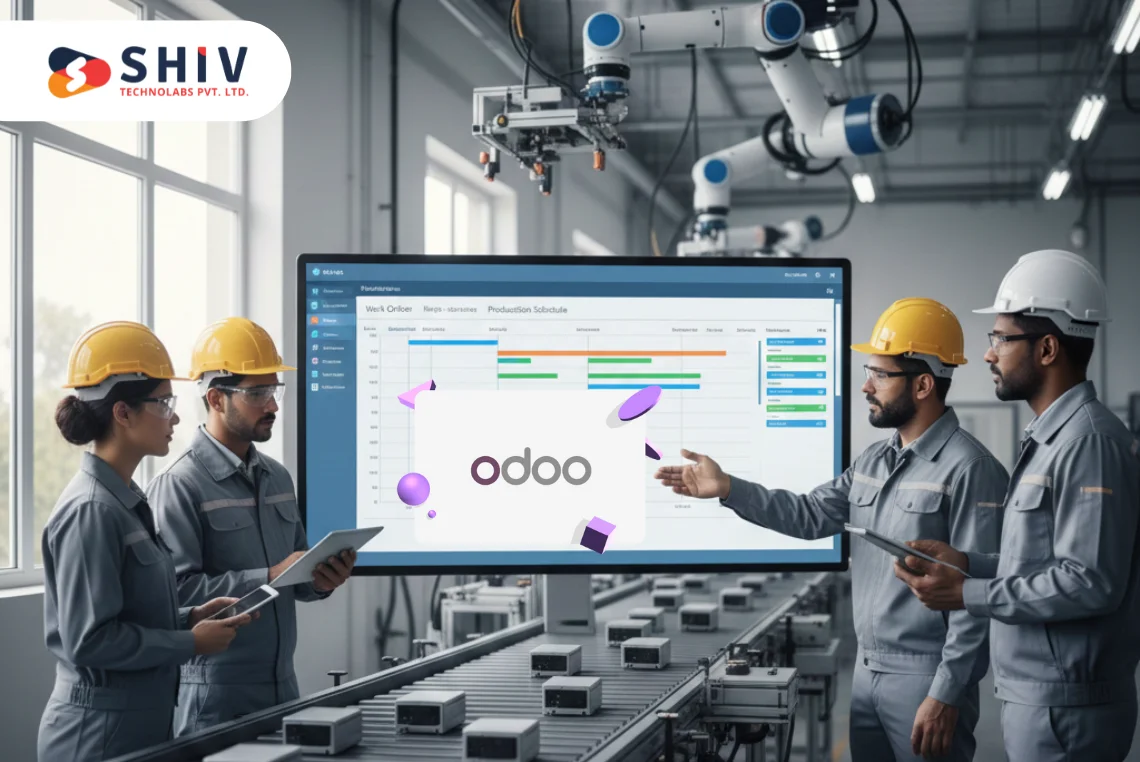Table of Contents
The manufacturing industry is constantly evolving, and companies need robust solutions to stay competitive. One such solution is the Odoo Manufacturing Module, which offers a comprehensive suite of tools to manage manufacturing operations efficiently.
This blog will provide an in-depth look at the Odoo Manufacturing Module cost, Odoo manufacturing cost, and Odoo manufacturing cost analysis, along with the features and processes involved in using the Odoo Manufacturing Module.
Types of Manufacturing Modules in Odoo and Development Costs

Odoo Manufacturing Module is highly modular and flexible, allowing businesses to choose specific features and functionalities based on their needs. Here are the main types of manufacturing modules available in Odoo:
# Bill of Materials (BoM)
- Manages the list of raw materials and components needed to manufacture a product.
- Supports multi-level BoMs for complex products.
# Work Orders
- Manages the execution of production tasks.
- Allows scheduling, tracking, and updating work orders in real-time.
# Production Planning
- Facilitates the scheduling and management of production activities.
- Includes tools for Make-to-Order (MTO) and Make-to-Stock (MTS) production strategies.
# Inventory Management
- Integrates with the inventory module for real-time tracking of raw materials and finished goods.
- Automates reordering processes to maintain optimal inventory levels.
# Quality Control
- Ensures product quality through inspections and quality control points.
- Manages quality alerts and non-conformance issues.
# Maintenance Management
- Schedules preventive and corrective maintenance for equipment.
- Tracks equipment performance and maintenance history.
# Reporting and Analytics
- Provides comprehensive reporting tools to analyze production performance.
- Customizable reports for inventory levels, work order status, and more.
Also Read:- A Comprehensive Guide to Optimize Website With SEO Tools in Odoo 17
# Odoo Manufacturing Module Cost
Implementing the Odoo Manufacturing Module involves various costs, including subscription fees, implementation costs, and additional development costs for customization. Below is a table summarizing these costs:
| Cost Type | Description | Estimated Cost |
|---|---|---|
| Subscription Fees | Monthly or annual fee per user for accessing the manufacturing module. | $20 – $30 per user per month |
| Implementation Costs | One-time cost for setting up the system, data migration, and initial training. | $5,000 – $15,000 |
| Support and Maintenance | Ongoing cost for support packages, ranging from basic to premium services. | $2,000 – $10,000 per year |
| Customization and Development | Additional cost for custom features and workflows, if required. | $100 – $200 per hour |
# Dedicated Developer for Odoo Manufacturing Module
For businesses that require extensive customization or ongoing development support, hiring a dedicated developer can be beneficial. The cost of a dedicated developer varies based on experience, location, and the complexity of the tasks. Below is a table summarizing the estimated costs for dedicated developers:
| Developer Type | Description | Estimated Cost |
|---|---|---|
| Junior Developer | Entry-level developer with basic knowledge of Odoo and customization tasks. | $3,000 – $5,000 per month |
| Mid-Level Developer | Experienced developer capable of handling more complex customization and integration tasks. | $5,000 – $8,000 per month |
| Senior Developer | Highly experienced developer with expertise in Odoo and large-scale implementations. | $8,000 – $12,000 per month |
# Cost-Benefit Analysis
When considering the cost of the Odoo Manufacturing Module, it is essential to perform a cost-benefit analysis. While the upfront costs may seem significant, the long-term benefits often outweigh these initial investments. For example, improved efficiency in manufacturing processes, better inventory management, and reduced downtime can lead to substantial cost savings over time.
Businesses should also consider the flexibility and scalability of the Odoo Manufacturing Module. As the business grows, the module can be easily scaled to accommodate increased production demands, making it a sustainable long-term investment.
Features of Odoo Manufacturing Module

Odoo Manufacturing Module is packed with features designed to streamline manufacturing operations. Here are some of the key features:
1) Bill of Materials (BoM)
The module allows users to create detailed Bills of Materials. A BoM includes all the components and sub-assemblies required to manufacture a product. It supports multi-level BoMs, making it suitable for complex manufacturing processes.
- Multiple Levels: Support for multi-level BoMs allows for detailed structuring of products and their components, ensuring accurate material requirements and cost calculations.
- Flexible BoM Management: Users can create variations of BoMs for different versions of a product, catering to specific customer needs or changes in design.
2) Work Orders
Users can generate work orders to manage production tasks efficiently. Work orders can be scheduled, tracked, and updated in real-time, ensuring that production processes are on track.
- Real-Time Updates: Keep track of work orders in real-time, allowing for immediate adjustments and updates to ensure timely completion.
- Resource Allocation: Assign tasks to specific work centers or employees, ensuring optimal use of resources and reducing bottlenecks in production.
3) Production Planning
Odoo Manufacturing provides robust tools for production planning. Users can plan production schedules, allocate resources, and manage timelines to meet production targets. The module also supports Make-to-Order (MTO) and Make-to-Stock (MTS) production strategies.
- Dynamic Scheduling: Adjust production schedules dynamically based on order priorities, resource availability, and production capacity.
- Gantt Chart View: Visualize production schedules using Gantt charts, making it easier to manage timelines and identify potential delays.
4) Inventory Management
The module integrates seamlessly with Odoo Inventory, allowing for real-time inventory tracking. It ensures that materials are available when needed, reducing downtime and improving production efficiency.
- Real-Time Inventory Tracking: Monitor inventory levels in real-time, ensuring that materials are available when needed and reducing the risk of stockouts.
- Automated Reordering: Set reorder points and automate the procurement process to maintain optimal inventory levels and minimize carrying costs.
5) Quality Control
Quality control is crucial in manufacturing. Odoo Manufacturing includes features for setting up quality control points, conducting inspections, and managing quality alerts. This helps in maintaining product quality and compliance with industry standards.
- Inspection Points: Define quality control points at various stages of production to ensure that products meet quality standards at each step.
- Non-Conformance Management: Manage non-conformances and quality alerts effectively, enabling prompt corrective actions to maintain product quality.
6) Maintenance Management
The module supports preventive and corrective maintenance for manufacturing equipment. Users can schedule maintenance tasks, track equipment performance, and reduce unexpected breakdowns.
- Preventive Maintenance: Schedule regular maintenance tasks to prevent equipment breakdowns and ensure smooth production operations.
- Maintenance Records: Keep detailed records of maintenance activities, helping in analyzing equipment performance and planning future maintenance.
7) Reporting and Analytics
Odoo Manufacturing provides comprehensive reporting and analytics tools. Users can generate reports on production performance, inventory levels, and work order status. The analytics tools help in making data-driven decisions to improve manufacturing processes.
- Customizable Reports: Generate customizable reports to track key performance indicators and gain insights into production operations.
- Data-Driven Decisions: Use analytics tools to analyze production data and make informed decisions to enhance manufacturing efficiency.
Also Read:- Odoo vs. NetSuite: A Detailed Comparative Analysis
Process of Using Odoo Manufacturing Module
Implementing and using the Odoo Manufacturing Module involves several steps. Here’s a detailed look at the process:
1) Implementation
# Needs Assessment
The first step is to conduct a thorough needs assessment. This involves understanding the specific requirements of the manufacturing processes, identifying key pain points, and defining the goals for the Odoo implementation.
- Stakeholder Interviews: Conduct interviews with key stakeholders to gather detailed requirements and understand their expectations from the system.
- Process Mapping: Map existing manufacturing processes to identify areas for improvement and to ensure that the Odoo Manufacturing Module aligns with current workflows.
# Customization and Configuration
Based on the needs assessment, the next step is to configure and customize the Odoo Manufacturing Module. This may involve setting up custom workflows, creating specific BoMs, and integrating with other systems used by the business.
- Workflow Customization: Customize workflows to match the specific needs of the manufacturing processes, ensuring that the system supports efficient operations.
- System Integration: Integrate the Odoo Manufacturing Module with other business systems, such as ERP, CRM, and accounting, to create a unified platform.
# Data Migration
Data migration is a critical step in the implementation process. It involves transferring existing data, such as inventory levels, supplier information, and production schedules, into the Odoo system. This step ensures that all necessary information is available in the new system.
- Data Mapping: Map existing data to the new system to ensure accurate migration and to maintain data integrity.
- Data Validation: Validate the migrated data to ensure accuracy and completeness, minimizing the risk of data discrepancies.
# Training
Training is essential for ensuring that users are comfortable with the new system. Odoo offers various training programs, including online courses, on-site training, and user manuals. Training helps users to understand how to use the module effectively and to leverage its full potential.
- Role-Based Training: Provide training tailored to the specific roles of users, ensuring that they understand how to use the system for their specific tasks.
- Hands-On Workshops: Conduct hands-on workshops to give users practical experience with the system, helping them to become proficient in using the module.
2) Day-to-Day Operations
# Creating and Managing BoMs
Once the system is up and running, users can start by creating Bills of Materials for the products they manufacture. The BoM feature allows for easy management of product components and sub-assemblies.
- BoM Templates: Create templates for common BoMs to streamline the process of creating new BoMs for similar products.
- Version Control: Manage different versions of BoMs to accommodate design changes and product variations.
# Scheduling Work Orders
Work orders can be scheduled based on production needs. Users can assign tasks to specific work centers, track the progress of each task, and ensure that production deadlines are met.
- Priority Management: Set priorities for work orders to ensure that critical tasks are completed first and production schedules are met.
- Real-Time Tracking: Track the status of work orders in real-time, allowing for prompt adjustments and updates to the production schedule.
# Inventory Management
Inventory management is an ongoing process. Users need to regularly update inventory levels, track material usage, and reorder materials as needed. The integration with Odoo Inventory makes this process seamless.
- Cycle Counting: Implement cycle counting to maintain accurate inventory records and reduce the need for full physical inventory counts.
- Supplier Management: Manage relationships with suppliers to ensure timely delivery of materials and maintain optimal inventory levels.
# Quality Control
Quality control checks should be conducted at various stages of the production process. Users can set up quality control points, conduct inspections, and address any quality issues that arise.
- Quality Checklists: Use checklists to ensure that all quality control steps are followed consistently and thoroughly.
- Corrective Actions: Implement corrective actions for any quality issues identified, ensuring that they are addressed promptly and effectively.
# Maintenance Management
Regular maintenance of manufacturing equipment is essential for ensuring smooth operations. Users can schedule preventive maintenance tasks, track equipment performance, and address any maintenance issues promptly.
- Maintenance Scheduling: Schedule maintenance tasks based on equipment usage and performance data to minimize downtime.
- Performance Monitoring: Monitor equipment performance to identify potential issues early and take preventive measures.
3) Continuous Improvement
# Monitoring Performance
The Odoo Manufacturing Module provides various tools for monitoring production performance. Users can generate reports and analyze data to identify areas for improvement.
- Key Performance Indicators (KPIs): Track KPIs such as production efficiency, yield rates, and downtime to measure performance and identify areas for improvement.
- Root Cause Analysis: Conduct root cause analysis for any issues identified, helping to implement effective solutions and prevent recurrence.
# Adjusting Processes
Based on performance data, users can make adjustments to manufacturing processes. This may involve optimizing production schedules, improving inventory management, or enhancing quality control procedures.
- Process Optimization: Identify and implement process improvements to enhance efficiency and reduce waste in manufacturing operations.
- Continuous Feedback Loop: Establish a feedback loop to gather input from users and continuously refine processes based on their experiences.
# Scaling Operations
As the business grows, the Odoo Manufacturing Module can scale to meet increased production demands. Users can add more users, integrate additional modules, and customize the system further to support business expansion.
- Modular Expansion: Add new modules as needed to support additional business functions, such as sales, procurement, and customer relationship management.
- User Management: Manage user roles and permissions to ensure that new users have the access they need while maintaining security and control over the system.
Conclusion
The Odoo Manufacturing Module offers a robust solution for managing manufacturing operations. Its cost-effective pricing structure, comprehensive features, and streamlined processes make it an ideal choice for businesses looking to improve their manufacturing efficiency. By implementing and using the Odoo Manufacturing Module, companies can achieve better production planning, inventory management, quality control, and overall operational efficiency.
The journey of implementing Odoo Manufacturing involves careful planning, customization, and continuous improvement. With the right approach, businesses can harness the power of Odoo to transform their manufacturing operations, achieving greater productivity, better quality products, and ultimately, higher customer satisfaction.
Investing in the right manufacturing management solution is crucial for staying competitive in today’s dynamic industry. The Odoo Manufacturing Module offers a versatile and cost-effective platform to improve your operations, increase productivity, and maintain high-quality outputs. Understanding the Odoo Manufacturing Module cost, conducting a thorough Odoo manufacturing cost analysis, and making informed decisions about your investment can lead to substantial long-term benefits. At Shiv Technolabs, we specialize in Odoo development and help businesses create and customize their ERP systems to meet unique needs. As an Odoo development company in Germany, we are well-equipped to assist you in maximizing the full potential of Odoo and achieving your manufacturing goals. Contact us today to learn how we can support your business.




















